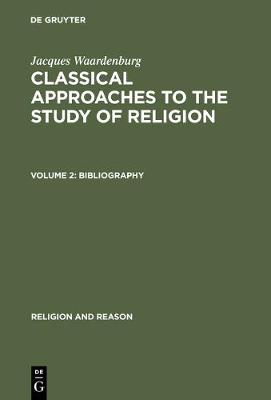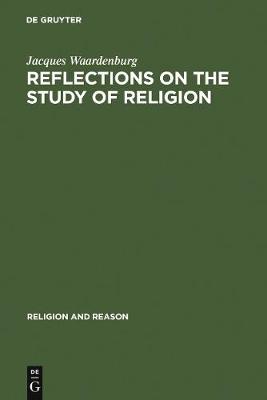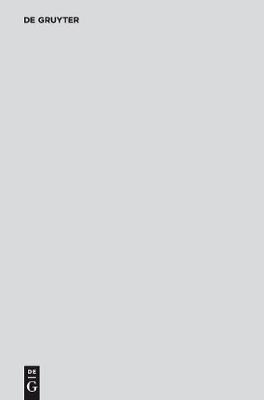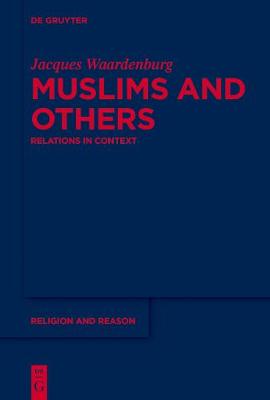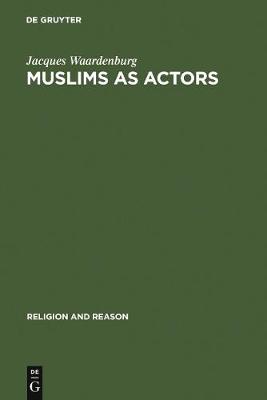Religion and Reason
5 primary works
Book 4
Since its founding by Jacques Waardenburg in 1971, Religion and Reason has been a leading forum for contributions on theories, theoretical issues and agendas related to the phenomenon and the study of religion. Topics include (among others) category formation, comparison, ethnophilosophy, hermeneutics, methodology, myth, phenomenology, philosophy of science, scientific atheism, structuralism, and theories of religion. From time to time the series publishes volumes that map the state of the art and the history of the discipline.
Book 15
Sinceits founding by Jacques Waardenburg in 1971, Religion and Reason has been a leading forum for contributions on theories, theoretical issues and agendas related to the phenomenon and the study of religion. Topics include (among others) category formation, comparison, ethnophilosophy, hermeneutics, methodology, myth, phenomenology, philosophy of science, scientific atheism, structuralism, and theories of religion. From time to time the series publishes volumes that map the state of the art and the history of the discipline.
Book 40
This book presents some twenty essays on different aspects of Islam in history and the present. These essays are grouped into eight larger sections. The first, "The Beginnings", deals with the transition from pre-Islamic understandings and reason, an essential part of the Quranic message. The next two sections deal with Islam specifically as a religion with its particular signs and symbols. The question of rules of interpretation in Islam and its structural features is discussed here. Sections four and five deal with ethics in Islam, including Muslim identity and human rights, and certain social functions of Islam. Section six introduces some 19th and 20th century reform movements, with special attention given to developments in Saudi Arabia and the "puritan" characteristics of present-day Islamic revival movements. The final two sections discuss contemporary issues: Islamization processes and policies, Islamic ideologies, the ideologization of Islam, and the political uses of religion. Throughout the book the author shows the links between the religious and other interpretations and uses made of Islam and the contexts in which they are made. The Introduction signals some important developments in Islamic studies since World War II.
Book 41
Jacques Waardenburg writes about relations between Muslims and adherents of other religions. After illuminating various aspects of Islam from an outside point of view in his volume "Islam" (published in 2002 by de Gruyter) his second volume changes the perspective: The author shows how Muslims perceived non-Muslims - particularly Christianity and "the West", but also Judaism and Asian religions - in many centuries of religious dialogue and tensions. The main focus is on Muslim minorities in Western countries and on religious dialogues of which he provides first-hand knowledge through his participation in several important dialogue meetings.
After 50 years of research and personal involvement, Waardenburg aims at a mutual understanding and reconciliation of Islam and other religions, particularly Christianity, both on an international level as well as on a more local level where "old" and "new", Christian and Muslim Europeans live together.
After 50 years of research and personal involvement, Waardenburg aims at a mutual understanding and reconciliation of Islam and other religions, particularly Christianity, both on an international level as well as on a more local level where "old" and "new", Christian and Muslim Europeans live together.
Book 46
This book deals with Islamic studies and with the question how the scholarly study of religion can contribute to the study of Islam. The author advocates studying Islamic phenomena as signs and symbols interpreted and applied in diverse ways in existing traditions.
He stresses the role of Muslims as actors in the ongoing debate about the articulation of Islamic ways of life and construction of Islam as a religion. A careful study of this debate should steer clear of political, religious, and ideological interests. Research in this area by Muslims and non-Muslim scholars alike should address the question of what Muslims have made of their Islam in specific circumstances.
Current political contexts have created an unhealthy climate for pursuing an "open" approach to Islam based on reading, observing, listening and reflecting. Yet, precisely nowadays we need to look anew at ways of Muslim thinking and acting that refer to Islam and to avoid certain schemes of interpreting Muslim realities that are no longer adequate for present-day Muslim life situations.
Muslim recourses to Islam can be studied as human constructions of value and meaning, and relations between Muslims and others can be seen in terms of human interaction, without blame always falling on Islam as such.
He stresses the role of Muslims as actors in the ongoing debate about the articulation of Islamic ways of life and construction of Islam as a religion. A careful study of this debate should steer clear of political, religious, and ideological interests. Research in this area by Muslims and non-Muslim scholars alike should address the question of what Muslims have made of their Islam in specific circumstances.
Current political contexts have created an unhealthy climate for pursuing an "open" approach to Islam based on reading, observing, listening and reflecting. Yet, precisely nowadays we need to look anew at ways of Muslim thinking and acting that refer to Islam and to avoid certain schemes of interpreting Muslim realities that are no longer adequate for present-day Muslim life situations.
Muslim recourses to Islam can be studied as human constructions of value and meaning, and relations between Muslims and others can be seen in terms of human interaction, without blame always falling on Islam as such.
